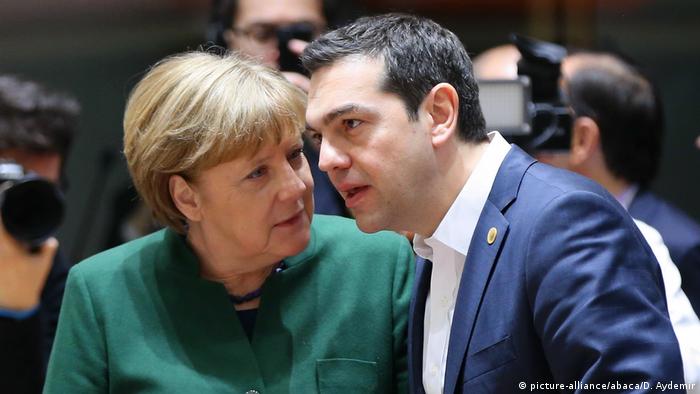German Chancellor Angela Merkel travels to Athens. Unlike their last visit of 2014, the hosts are in a good mood. A point of contention in Greece, but still for excitement.

Merkel and Tsipras in an interview at a summit in Brussels
The debt crisis has strained the relationship between Germany and Greece: As opposition politicians grumbled Alexis Tsipras prior to taking office as Premier (2015) against the “austerity dictates from Berlin”, while German government politicians outlet the Greeks a Euro suggested. Since then, things have changed: In record time, took place Tsipras as head of government, his turning to realism, all the austerity conditions, and was cooperative in responding to the refugee crisis in the South of Europe.
Therefore, the journey of Angela Merkel standing to Athens, under good omens, thinks yorgos Tzogopoulos, a senior lecturer in International relations at the University of Thrace. “This visit signals support for the implementation of the economic reforms in Hellas,” said Tzogopoulos in an interview with DW. Apparently, the Chancellor can see in Tsipras, a politician who had learned from his mistakes.
Four years ago, Tsipras had to “compromise to accept the humiliating”, says Tassos Papas, a political journalist and columnist for the left-wing “newspaper of the editors”. “However, over time, he could not donors the money a lot more work.” As an example, he cites the decision of the Prime Minister, on the advice of the International monetary Fund (IMF) approved the pension cuts for 2019 back. The announcement by Tsipras to raise the minimum wage and the collective to introduce the negotiations, seem to encounter. The conclusion of the journalist Papas: Even the lender is no longer responsible for the “pure doctrine” of the austerity policy.
Excitement around the name of Macedonia
Much more important than the economic reforms of the recent compromise to Macedonia, currently Angela Merkel, Papas believes. As a reminder: In the summer of 2018 Greece and the Republic of Macedonia agreed on a solution to the longstanding name dispute. Accordingly, it will rename the Northern neighbouring state of Greece in “Northern Macedonia”. In return, the Athens government is committed to the national identity of the neighbor to acknowledge the negotiations on its accession to NATO to approve.
Last week, Deputy government spokesperson Martina Fietz said in Berlin, the German government welcomed this agreement. However, the consent of the Greek Parliament, is not yet sure, although presumably a simple majority of 151 of the 300 votes would suffice. The ruling left party Syriza has only 145 seats and can not bring the agreement alone. The right-wing populist ANEL party, Tsipras serves as a Junior partner and majority buyer, rejects a compromise in name dispute with Macedonia and wants to emergency exit from the government. What to do?
Policy-a Journalist, Papas believes that Tsipras achieved the required majority with the help of smaller splinter parties. Even more important is the reaction of the conservative opposition leader, Kyriakos Mitsotakis, has so far refused to compromise to Macedonia. “It is strange,” says the Athenian Analyst, “if you look at the European people’s party – the conservative party family in Europe, there are only two parties, opposed to a compromise, namely, the New democracy in Athens and the VMRO in Skopje.” To the objection that, after all, the two countries that are directly affected, says Papas, Merkel will probably intervene in this matter. “Mitsotakis will not change his opinion on the name dispute, but the Chancellor will probably exert the necessary pressure, so he agrees to at least one NATO-accession of the neighbouring country,” says Papas.

Not welcome: protest against Merkel’s visit in Athens in the spring of 2014
The political scientist Tzogopoulos speaks of a “positive agreement”. He did not expect Greece could impose on the neighbors actually change the name. It is only logical that the other side in the sense of a real compromise solution also gets something – namely, the recognition of a Macedonian language and identity. For Tzogopoulos of the dispute to the conservative Opposition in Athens is more of a theoretical nature: “in Spite of his negative attitude Mitsotakis has signaled that, for him, there is nothing left to respect than the agreement, it should bring Tsipras in the Parliament.” It was clear, however, that the Chancellor advertises in Athens for an agreement to bring more stability to the Western Balkans.
The atmosphere is right
The last Greece visit of Angela Merkel in the year 2014 seems to be an eternity ago. At the height of the debt crisis, the then conservative government chef and host, Antonis Samaras, sought to ensure a favorable reception. Nevertheless, he seemed to be upset because, of all things, to him politically close to Chancellor refused to agree to his financial and political special requests. The left politician Alexis Tsipras – at the time still in Opposition – accused Merkel only came to Athens, in order to support the “corrupt political System”. The unions had called for protest actions, even the journalists of the state TV ERT went on strike. Almost surreal, the poetic, but the comment seemed at the time, free-TV-pictures of Samaras and Merkel, who strolled in the Athens government district under the citrus trees.
Today, the hosts are in a good mood: Angela Merkel will remain over night and take time for a visit to the German school of Athens, which has, since 2011, the seal of quality “Excellent German school abroad”. According to the media, want to meet up on the left of Premier Tsipras and the German Chancellor also eat Fish reports – at the port of Piraeus, next to the sea, as welcome guests.

